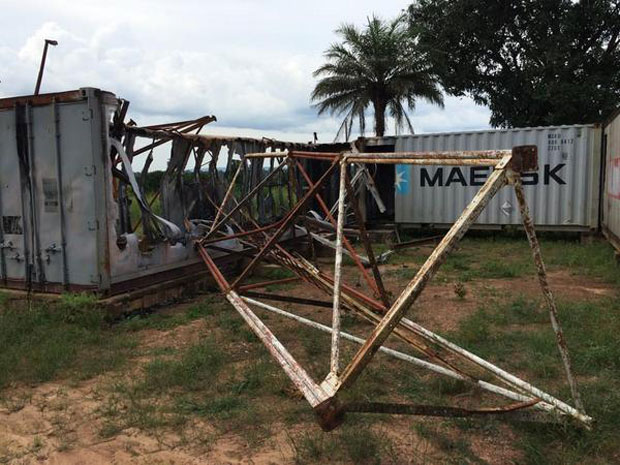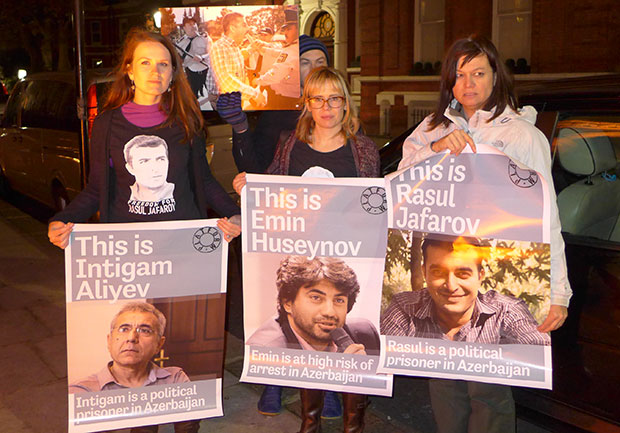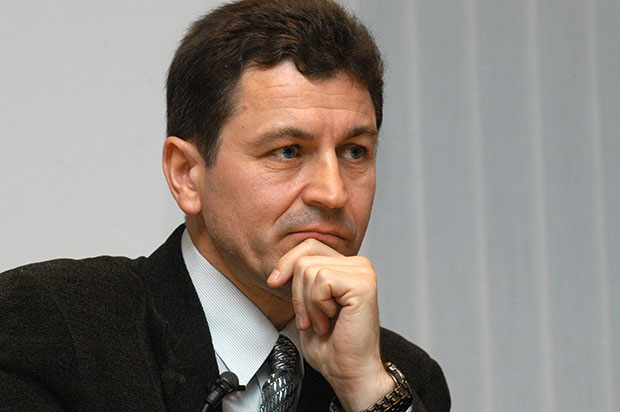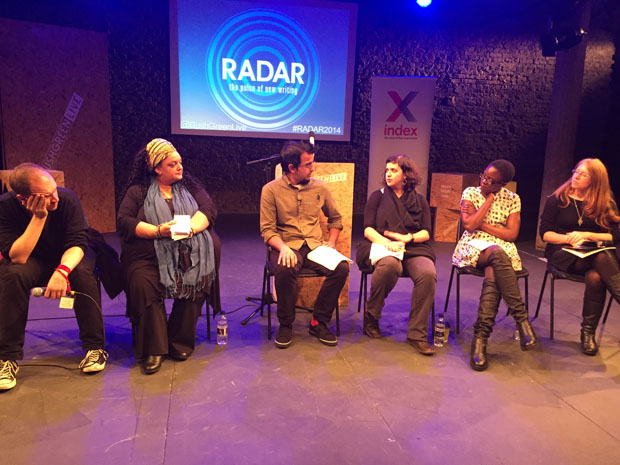19 Nov 2014 | Africa, Central African Republic, News and features, Politics and Society, Religion and Culture, United Nations

Bambari’s last functioning radio station was looted on 7 July. (Photo: Jonathan Pedneault / Internews)
The arrival of MINUSCA, a United Nations’ peacekeeping force, on 15 September briefly pushed the continuing crisis in Central African Republic to break back into international headlines. This conflict, which has claimed thousands of lives since the Séléka coup in March 2013, is repeatedly referred to as a “forgotten crisis”, “neglected tragedy” and “the worst crisis you’ve never heard of”.
In fact, with almost half the population of 4.6 million in need of emergency aid, the country is caught up in the worst humanitarian and political crisis of its history. In the short months since the Blue Helmets arrived in Bangui, violent clashes have killed at least 12, wounded many more and further complicated already strained relief operations. Since almost all aid passes through the capital, violence there cuts off assistance for the rest of the country. Crime is rampant, with freedom of movement severely restricted by both security concerns and checkpoint bribes.
As the fighting flared up once again, Mahruhk Hasan, head of monitoring and evaluation for Internews, pointed out on Twitter in October that a quick Google search provided only seven stories in the international, English-speaking media.
While frustration over the lack of international media attention is legitimate and necessary, it is crucial to consider what is happening to the media at a local level. Disturbingly, the scant information readers in the West receive may often be more than the residents get in the country itself. Condemning the lack of global media coverage overlooks the crisis enveloping the Central African Republic’s media. The bloodshed has led to an information blackout, with local radio stations and newspapers often being casualties of the conflict.
In a country twice the size of the UK, with only a few hundred kilometres of tarmac, poor mobile connectivity and a largely rural population heavily reliant on radio, the national broadcaster has stopped airing with no sign of return. Many other radio stations have been looted, with most going mute at least 18 months ago. As of late July 2014, there were 15 operational radio stations across the country – but 14 further stations have fallen silent, including the single station in northern Vakaga province, which is the area with the highest number of internally displaced people. A recent report by International Media Support found “Central Africans are living in complete darkness as they have no access to information.”
This “darkness” serves to exacerbate a dangerous culture of rumours, with serious implications for further loss of life. MINUSCA’s deployment is phased, and will not reach peak until January 2015. In an already dicey security context, where the protection of NGO staff and aid workers is severely compromised, it is proving logistically impossible to provide journalists with protection.
The journalistic profession has never been particularly stable in CAR, affected by poor and inconsistently paid salaries, as well as corruption and lack of resources. Since the conflict began, pressure and violence have had serious effects on self-censorship.
Reporters Without Borders recently provided a summary of the persecution of journalists during the three months ending 31 May 2014, including the case of Elisabeth Blanche Olofio, a radio journalist killed in connection with her work after being accused of having “a sharp tongue”.
Two other journalists, Désiré Luc Sayenga and René Padou, died of the injuries they received in a brutal attack in unclear circumstances. There have also been numerous incidents of harassment and telephone threats, as well as journalists being summoned by judicial authorities before fleeing the country. CAR had the biggest fall of any country in the 2014 Reporters Without Borders Press Freedom Index, dropping 43 places to 109 out of 180 countries.
In conflict situations, discussion of censorship often centres on whether such measures are justified in keeping citizens safe, and whether or not “national security” is simply a convenient excuse for governments to silence their critics. But in the case of Central African Republic, the state is still far too weak to exert any kind of strong censorship.
Instead, reporting remains limited and compromised due to fear. This level of suffering, in a crisis so determined by deep-set prejudices, has a clear effect on the professionalism and impartiality of journalists. As Jonathan Pedneault, Conflict-Sensitive Journalism Trainer with Internews in CAR, highlights: “Discourses are so polarised in CAR, and the problem is that everyone thinks they have the true story.”
This isn’t to suggest that journalists in Bangui aren’t subject to top-down censorship. Pedneault references a case in late October where journalists were threatened with a 25,000,000 CFA franc (£30491.25) fine when they remained silent after being summoned by the High Council for Transitional Communications. In their own words, the council were questioning the journalists’ credibility and editorial line in a crisis situation when they ought “to censor some things”.
Internews have been working in Central African Republic since 2010, supporting local media and providing in-situ training and mentoring to journalists, with a special focus on conflict-sensitive reporting. They are only too aware of the extreme psychological impact of the recent conflict on journalists, understanding that they are subject to the fear and trauma affecting the entirety of the population. Many journalists express “concerns over personal safety after they report”, particularly outside Bangui, Pedneault said
Internews is working closely with the local Association of Journalists for Human Rights (RJDH), giving reporters the space to discuss and better understand the root causes of the conflict, as well as recognising their own personal biases. Pedneault underlines that the conflict has meant “the judicial system has been destroyed”, which fosters a sense of insecurity, particularly in a country with an armed population able to “take bold action”.
Pedneault explained that the weak state means self-censorship is an issue tied mostly to the personality of the journalists and their own fears: “I’d not consider it political censorship, but attuned to each journalist.” These fears, tragically, are not unfounded.
On 8 October, the pregnant aunt of one of the RJDH journalists was abducted; the following day the journalist received an anonymous call informing her that her aunt’s disembowelled body could be found in the PK5 district. It is hard to say whether this tragedy is directly linked to her work as a journalist, or whether it is simply a terrible facet of the violence engulfing everyone in Central African Republic.
In Bambari, a flashpoint for the conflict where 71 per cent of the population is displaced, the two remaining radio stations were looted in early July and journalists have not returned to work, fearing for their lives. This took place amid accusations that the broadcasts were biased and encouraging violence.
To better understand the media landscape in CAR, as well as the prevalence of hate speech, Internews has been conducting media monitoring, and in Bambari have begun creating an interfaith radio station in an attempt to foster community cohesion alongside improved communication. As well as working closely with RJDH in Bangui, supporting them to produce a daily radio show in French and Sango and between 5-10 articles per day, Internews is supporting the return of local media in more remote areas.
Pedneault works as a roving trainer, travelling to rural areas and working embedded in the newsroom, supporting the journalists in their own environment. Internews is fostering a network of voluntary community and professional correspondents and developing a cadre of writers and broadcasters who can be an engine for change.
Hasan underlines that Internews and RJDH have been open to the use of pseudonyms when broadcasting, offering a greater sense of security and encouraging individuals to speak out. The coverage maps produced by Internews are also allowing humanitarian actors to link with local media and facilitate the dissemination of lifesaving information.
Jacobo Quintanilla, Director of Humanitarian Communications Programmes, said that with shortwave radio, you compromise on sound quality but maximise outreach: “You can reach refugees living in camps in Chad.” Hasan highlighted Internews’ plans to distribute wind-up radios for use by internally displaced populations, further extending the spread of information.
“Some of these radio stations are literally lifelines,” Quintanilla said.
In Central African Republic, information is aid – and this is true not only in terms of facilitating immediate humanitarian relief, but also for longer term peace-building. When confronting the huge task of restoring mutual respect in a country torn apart by inter-community violence, journalists who are unafraid, uncensored and impartial can provide a platform for reconciliation.
This article was posted on 19 November 2014 at indexoncensorship.org
18 Nov 2014 | Azerbaijan, Azerbaijan News, News and features

(Photo: Index on Censorship
Organisations and individuals from across Europe gathered in front of Azerbaijani embassies on Monday to call for the release of political prisoners and demand Azerbaijan ends its crackdown on civil society.
Index on Censorship, joined by Platform London among others, held a demonstration outside the embassy of Azerbaijan, lighting near 100 candles, one for each political prisoner currently jailed on trumped up charges.
Azerbaijan’s National Revival Day is on 17 November. On this day in 1988, people started demonstrating in Azadliq (Freedom) Square, and the protest grew into a national movement that led to the declaration of national independence from the Soviet Union. Today, 26 years later, the people of Azerbaijan cannot even gather in Freedom Square to ask for the release of political prisoners. Freedom of expression and assembly are repressed, and those who dare speaking up face heavy consequences.

Protesters held a vigil in front of the Azerbaijan embassy in London to call for the release for political prisoners in the country. (Photo: Index on Censorship)
In the past six months, as Azerbaijan chaired the Council of Europe’s Committee of Ministers, authorities unleashed an unprecedented crackdown on civil society, including the imprisonment of human rights defenders and political activists. Others have been forced into hiding.
Those imprisoned during Azerbaijan’s chairmanship (14 May – 13 November 2014) include:
- Anar Mammadli, election monitor and this year’s Václav Havel Human Rights Prize recipient
- Leyla Yunus, justice advocate who was awarded the French Legion of Honour in 2013, and her husband Arif Yunus,
- Rasul Jafarov, campaigner who has criticised Azerbaijan at the Council of Europe and, together with Leyla Yunus, compiled a list of political prisoners in Azerbaijan,
- Intigam Aliyev, human rights lawyer who has criticised Azerbaijan at the Council of Europe.
As the situation continues to deteriorate, Azerbaijan is getting ready to host the first European Olympics in summer 2015, an event designed to whitewash the repressive regime’s record.
Platform London will be holding other demonstrations at 5pm everyday this week.
- Tuesday 18 November BP’s HQ – 1 St James’ Sq – 5pm
- Wednesday 19 November – Uk Foreign and Commonwealth Office on King Charles Street – 5pm
- Thursday 20 November – the European Bank for Reconstruction and Development, 1 Exchange Square (by Liverpool st) – 5pm
- Friday 21 November – the International Olympic Committee – 60 Charlotte Street
17 Nov 2014 | Awards, News and features, Russia

Former naval officer and journalist Grigory Pasko risked everything to uncover environmental degradation committed by the Russian Navy. (Photo: robertamsterdam.com)
In the 1990s, Grigory Pasko, a former naval officer and journalist, reported that Russia’s navy was dumping nuclear waste in the Sea of Japan (East Sea). After a series of articles exposing the environmental crimes, Russian federal security service agents arrested him in 1997, on charges of espionage and abuse of his official power. He was tried several times and eventually sentenced in December 2001 to four years of imprisonment for espionage. He was finally released in January 2003.
Pasko is one of many journalists who has been targeted by the Russian government. He says that freedom of speech and media in the country today, is not that different from when he was named International Whistleblower of the Year at the Index on Censorship Freedom of Expression Awards 13 years ago.
“It is just the same blatant rule by the security services, the same totalitarianism and lack of democratic institutions,” Pasko told Index in an email exchange.
Investigative journalists, in particular, are scarce in the current Russian environment, though the 1990 Law on the Mass Media [1991] states that journalists are allowed to carry on investigations. Article 29 of the Russian Constitution bans censorship altogether. However, under Vladimir Putin’s administration, Pasko said that press freedom and new, economically independent media have disappeared in favor of blatant propaganda.
Nominations for the 2015 Index on Censorship Freedom of Expression Awards close on 20 Nov.
Who will you nominate? A journalist? A digital activist? A campaigning organisation? An artist? Or all four?
“Investigative journalism barely exists as a genre in Russia,” Pasko said. “Journalists in our country are killed and put in prison.”
In March 2011, Pasko and his colleagues, Galina Sidorova and Igor Korolkov, established the Foundation for Investigative Journalism as a way to help professional and citizen journalists alike, as well as to create open discussion and respect for the law. It maintains “zero tolerance towards corruption in all forms”.
“Our goal is to help those who pursue this form of journalism,” Pasko said. “So far we have held schools in investigative journalism for journalists and bloggers in many towns throughout Russia. Unfortunately, funds from our sponsors limit us to holding only three such schools a year.”
Pasko said the foundation aims to teach journalists “to be free. To obey the law. To help the democratic development of journalism in Russia. To know how to use the rights they have been given by the constitution and the law. Not to be afraid.”
In a bleak time for journalists and a free media, Pasko said there is always hope for a brighter, freer future.
“The Russian public will feel a need for the truth, just as it has a need to drink fresh not stagnant water,” Pasko said. “Then society will have a need for independent free journalists. Our task and our goal meanwhile are not to let them disappear and keep the genre of investigative journalism alive.”
This article was posted on 17 Nov 2014 at indexoncensorship.org
14 Nov 2014 | Europe and Central Asia, Events, News and features, United Kingdom

(Photo: Melody Patry)
Should there ever be censorship of the arts was the subject of an Index/Bush Theatre debate, held last night. The event was provoked by the cancellation of Exhibit B in London, and Israeli play The City at this year’s Edinburgh Festival Fringe as well as controversy around this year’s Jewish Film Festival, all in the past few months.
Taking part in the debate were, among others: Stella Odunlami, artist and a cast member of Exhibit B; Zita Holbourne, artist, activist and co-organiser of the campaign to boycott the show; and Arik Eshet, artistic director of Incubator Theatre, which produced The City.
An Exhibit B performer Stella Odunlami told the audience: “We, a group of intelligent and informed actors and performers, have been censored and silenced by protestors, who truly have an ill-informed and misguided perspective of this significant and informative piece of work.
We are appalled, outraged, angry…extremely angry as artists, as human beings. We cannot believe that this is London in 2014. We are appalled that Exhibit B has been cancelled because of the actions of some of the demonstrators.”
Protester Zita Holbourne put her point of view as a poem, she said: “We said to them, Barbican please take that down, 2014 and you want to put black people in a cage? Then telling us you don’t understand our outrage!”
Read their full statements, made to the audience, below.
Stella Odunlami read the statement from the London cast of Exhibit B
It is with utter disappointment that we write these words.
Exhibit B is an important work that has given us an education into the lives of other human beings. We believe everybody has the right to their specific story being told, and this work provided that platform, through the medium of art – living and breathing. It is a shame that these stories will no longer be heard, seen, nor felt. An even greater shame that those who were open and brave enough to purchase a ticket, have now been robbed of that experience.
Exhibit B afforded us the opportunity to explore and engage with our past, while reminding and reawakening us to its impact on the present.
To the 23,000 petitioners who complained that Exhibit B objectified human beings – you missed the point.
This is the 21st Century and we believe that everyone has a choice, a right, an entitlement, to do or say whatever they deem to be right for them. We can accept someone seeing the piece and not liking it-that’s fine. What we cannot accept about the events of Tuesday evening and the subsequent cancellation of Exhibit B, is the physical action that was taken outside of the Vaults, by a minority of the demonstrators who would not even entertain the thought of seeing the piece.
We, a group of intelligent and informed actors and performers, have been censored and silenced by protestors, who truly have an ill-informed and misguided perspective of this significant and informative piece of work.
We are appalled, outraged, angry…extremely angry as artists, as human beings. We cannot believe that this is London in 2014. We are appalled that Exhibit B has been cancelled because of the actions of some of the demonstrators.
We are artists who, after thoughtful and careful deliberation, decide what projects we want to work on. Grown men and women who decided that our contribution to Exhibit B would be worthwhile and important. Who, on Tuesday, were told, by way of the protestor’s force, that we couldn’t make creative and life decisions for ourselves.
That complete strangers knew what was best for us.
For all of us.
Our voices and ideas were deemed not worthy of being shared with the world. This is exactly what Exhibit B is about: we want to denounce oppression, racism and bigotry. We want to denounce actions like this. And the fact that this is still happening in London in 2014, proves even more why this piece is necessary.
The anger and vitriol and hysteria which the protestors have and continue to level at the company of Exhibit B, astounds us.
It doesn’t feel rational. It doesn’ t feel measured. There simply has not been room for an exchange of ideas.
There’s such vulnerability in holding a mirror up to humanity. No one wants to see a representation of themselves oppressed, but it doesn’t mean that we shouldn’t look.
We welcome protest, but surely it’s best to have as much information beforehand, so your opinion is truly informed. Surely as a protestor, you have a duty to ensure your ‘peaceful protest’ really is peaceful. And, surely your right to protest should not impact another person’s freedom of thought and speech.
We are actors and performers who believe that art should be meaningful. Challenging. Provoking.
Not only for us, as participating collaborators in the work, but also for the audience who witness the work.
This project afforded us the opportunity to be the most vulnerable, most on display, silently engaging and being engaged, while exploring themes around other, sex, race, and gender.
Exhibit B was created with love and sensitivity. We are intelligent creatives who made a brave choice to be part of a thought provoking piece of work. As Londoners, we are embarrassed that this has happened in our city, as the show has already been seen by 25,000 people from all over the world, and will continue to tour.
We would like to thank the Barbican for their immense support and Brett Bailey for his inspired work.
Zita Holbourne read Prejudice, Privilege, Power: A Poem for the Barbican (listen to it here)
Barbican announced a human zoo in town
We said to them, Barbican please take that down
2014 and you want to put black people in a cage?
Then telling us you don’t understand our outrage!
Strapped to plane seats, placed in iron masks
And nobody in a whole arts institution thought to ask
Our views before taking a decision to host
Then you have the bare faced audacity to boast
That you’ve placed black people in a human zoo
Going around talking about the good it can do
In challenging racist attitudes and views
But to listen to our concerns you refuse
Shackles and cages at £20 per ticket
But you don’t get why we organised a picket
We don’t need to see a black woman shackled to a bed
To know that racism is rearing its ugly head
We’re forced to battle daily with modern day enslavement
Power and privilege versus our self-empowerment
You are arrogant telling those of us that live with racism every day
What is or is not racist, like we don’t have a say
Let’s make clear that a boycott campaign is not censorship
For your actions and failures you must take ownership
We don’t need a lecture on what it is to be banned
We’re treated like third class citizens in this land
Blocked by institutions, so take a moment, pause
Think about the anger and pain you cause
By insulting our ancestors, our histories
Adding insult to our multiple injuries
If anything is censored it’s the art we produce
Rejected repeatedly by art institutions that refuse
To acknowledge our stories told by us through art
We’ve never had a level playing field from the start
We have a legitimate right to protest
It’s disingenuous of you to suggest
That our demonstration was aggressive
When it was simply passionate and expressive
Using the very arts that you claim to stand for
To demonstrate our strength of feeling outside the door
We made music, danced, lifted our voices in song
Displayed placards that had our beautiful art on
Yet you state that we were extreme and threatening
In contrast, press there say we were peaceful and welcoming
Police confirm there was no damage, injury or arrest
So perhaps it’s you trying to censor our right to protest
Their singing was threatening is what the headlines say
Brandishing placards and drums that barred the way
You accuse us of blocking freedom of expression
But then you call our expression aggression!
What does this say about you as a leading arts institution?
When you resort to this vicious persecution
Barbican you are cowardly and insincere
Resorting to this malicious smear
You simply confirm what we said from the start
You are defending racism in the name of art
When prejudice, privilege and power are combined
Institutional racism becomes clearly defined.
Arik Eshet, Artistic Director of Incubator Theatre, spoke via Skype about the cancellation of The City at the Edinburgh Fringe Festival
The Index/Bush Theatre debate was part of the RADAR Festival.
This article was posted on 14 November 2014 at indexoncensorship.org





